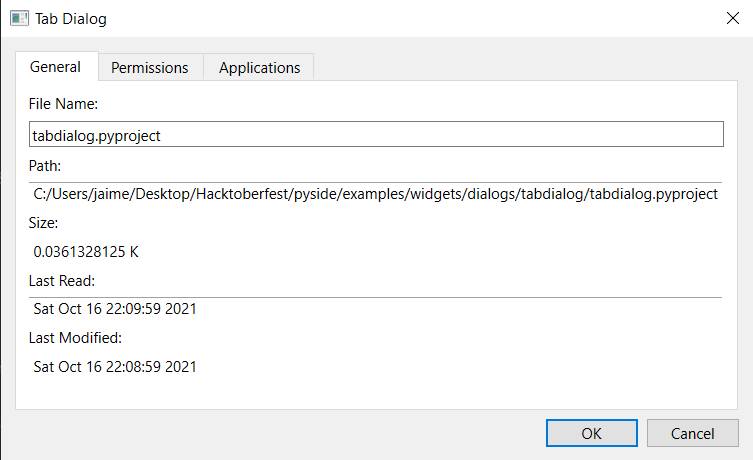Tab Dialog Example¶
Shows how to construct a tab dialog using the QTabWidget class.
The Tab Dialog example consists of a single TabDialog class that provides three tabs, each containing information about a particular file, and two standard push buttons that are used to accept or reject the contents of the dialog.

"""PySide6 port of the widgets/dialogs/tabdialog example from Qt v6.x"""
import sys
from PySide6.QtCore import QFileInfo
from PySide6.QtWidgets import (
QWidget,
QVBoxLayout,
QLabel,
QCheckBox,
QApplication,
QDialog,
QTabWidget,
QLineEdit,
QDialogButtonBox,
QFrame,
QListWidget,
QGroupBox,
)
class TabDialog(QDialog):
def __init__(self, file_name: str, parent: QWidget = None):
super().__init__(parent)
file_info = QFileInfo(file_name)
tab_widget = QTabWidget()
tab_widget.addTab(GeneralTab(file_info, self), "General")
tab_widget.addTab(PermissionsTab(file_info, self), "Permissions")
tab_widget.addTab(ApplicationsTab(file_info, self), "Applications")
button_box = QDialogButtonBox(
QDialogButtonBox.Ok | QDialogButtonBox.Cancel
)
button_box.accepted.connect(self.accept)
button_box.rejected.connect(self.reject)
main_layout = QVBoxLayout()
main_layout.addWidget(tab_widget)
main_layout.addWidget(button_box)
self.setLayout(main_layout)
self.setWindowTitle("Tab Dialog")
class GeneralTab(QWidget):
def __init__(self, file_info: QFileInfo, parent: QWidget):
super().__init__(parent)
file_name_label = QLabel("File Name:")
file_name_edit = QLineEdit(file_info.fileName())
path_label = QLabel("Path:")
path_value_label = QLabel(file_info.absoluteFilePath())
path_value_label.setFrameStyle(QFrame.Panel | QFrame.Sunken)
size_label = QLabel("Size:")
size = file_info.size() / 1024
size_value_label = QLabel(f"{size} K")
size_value_label.setFrameStyle(QFrame.Panel | QFrame.Sunken)
last_read_label = QLabel("Last Read:")
last_read_value_label = QLabel(file_info.lastRead().toString())
last_read_value_label.setFrameStyle(QFrame.Panel | QFrame.Sunken)
last_mod_label = QLabel("Last Modified:")
last_mod_value_label = QLabel(file_info.lastModified().toString())
last_mod_value_label.setFrameStyle(QFrame.Panel | QFrame.Sunken)
main_layout = QVBoxLayout()
main_layout.addWidget(file_name_label)
main_layout.addWidget(file_name_edit)
main_layout.addWidget(path_label)
main_layout.addWidget(path_value_label)
main_layout.addWidget(size_label)
main_layout.addWidget(size_value_label)
main_layout.addWidget(last_read_label)
main_layout.addWidget(last_read_value_label)
main_layout.addWidget(last_mod_label)
main_layout.addWidget(last_mod_value_label)
main_layout.addStretch(1)
self.setLayout(main_layout)
class PermissionsTab(QWidget):
def __init__(self, file_info: QFileInfo, parent: QWidget):
super().__init__(parent)
permissions_group = QGroupBox("Permissions")
readable = QCheckBox("Readable")
if file_info.isReadable():
readable.setChecked(True)
writable = QCheckBox("Writable")
if file_info.isWritable():
writable.setChecked(True)
executable = QCheckBox("Executable")
if file_info.isExecutable():
executable.setChecked(True)
owner_group = QGroupBox("Ownership")
owner_label = QLabel("Owner")
owner_value_label = QLabel(file_info.owner())
owner_value_label.setFrameStyle(QFrame.Panel | QFrame.Sunken)
group_label = QLabel("Group")
group_value_label = QLabel(file_info.group())
group_value_label.setFrameStyle(QFrame.Panel | QFrame.Sunken)
permissions_layout = QVBoxLayout()
permissions_layout.addWidget(readable)
permissions_layout.addWidget(writable)
permissions_layout.addWidget(executable)
permissions_group.setLayout(permissions_layout)
owner_layout = QVBoxLayout()
owner_layout.addWidget(owner_label)
owner_layout.addWidget(owner_value_label)
owner_layout.addWidget(group_label)
owner_layout.addWidget(group_value_label)
owner_group.setLayout(owner_layout)
main_layout = QVBoxLayout()
main_layout.addWidget(permissions_group)
main_layout.addWidget(owner_group)
main_layout.addStretch(1)
self.setLayout(main_layout)
class ApplicationsTab(QWidget):
def __init__(self, file_info: QFileInfo, parent: QWidget):
super().__init__(parent)
top_label = QLabel("Open with:")
applications_list_box = QListWidget()
applications = []
for i in range(1, 31):
applications.append(f"Application {i}")
applications_list_box.insertItems(0, applications)
if not file_info.suffix():
always_check_box = QCheckBox(
"Always use this application to open this type of file"
)
else:
always_check_box = QCheckBox(
f"Always use this application to open files "
f"with the extension {file_info.suffix()}"
)
layout = QVBoxLayout()
layout.addWidget(top_label)
layout.addWidget(applications_list_box)
layout.addWidget(always_check_box)
self.setLayout(layout)
if __name__ == "__main__":
app = QApplication(sys.argv)
if len(sys.argv) >= 2:
file_name = sys.argv[1]
else:
file_name = "."
tab_dialog = TabDialog(file_name)
tab_dialog.show()
sys.exit(app.exec())
© 2022 The Qt Company Ltd. Documentation contributions included herein are the copyrights of their respective owners. The documentation provided herein is licensed under the terms of the GNU Free Documentation License version 1.3 as published by the Free Software Foundation. Qt and respective logos are trademarks of The Qt Company Ltd. in Finland and/or other countries worldwide. All other trademarks are property of their respective owners.
